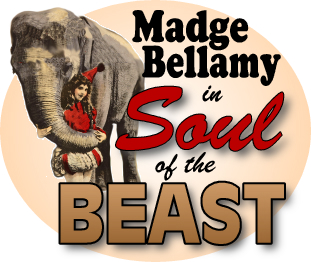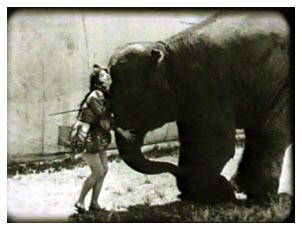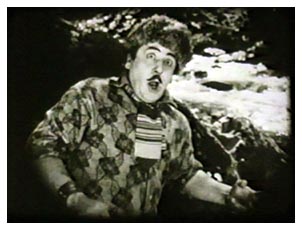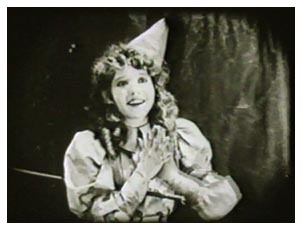

Released May 7, 1923
Thomas H. Ince Corporation
Directed by John Griffith Wray
Cast: Madge Bellamy (Ruth Lorrimore), Cullen Landis (Paul Nadeau),
Noah Beery (Caesar Durand), Vola Vale (Jacqueline Boussut), Bert
Sprotts (Silas Hamm), Vernon Dent (carnival patron)
Ruth Lorrimore and her elephant, Oscar, are an act in her stepfather Silas Hamm's circus. He treats all of the carnival workers harshly including Ruth. When the lady who portrays the Wild Girl in a cage quits after an argument with Hamm, he forces Ruth to take her place. While locked in the cage during the show, she is a "pitiable understudy" for the previous performer - and when she is required to eat raw meat as a part of the act, she can't make herself do it and cries. Suddenly a storm comes up that drives away all the patrons while knocking down the tents and causing chaos. Ruth can't get out of the cage, but Oscar comes to her rescue, knocking down the bars. They ride off into the stormy night. The next morning, they encounter Paul, a young man who plays the violin for money so he can save enough to have his twisted knee corrected. Paul is hounded by the evil Caesar Durand who claims Paul's deceased father owed him money. Durand says he will return the next day for the money. So, after Durand leaves, Paul takes his belongings and his pet rabbit and leaves. He falls into a hole that is a bear trap. A tree trunk over the hole prevents his escape. Ruth and Oscar come along, and Oscar removes the tree. Oscar runs away because of a skunk, and Ruth follows, running right into the hands of Durand. He takes her to Madame Boussut who runs the local saloon, and Ruth begins working in the kitchen there. A couple of months later, a beautiful dress is displayed in the local store window, and all of the women are admiring it. Paul uses his savings to buy the dress for Ruth's birthday. Durand finds them celebrating her birthday by a stream and takes her back to the saloon. He tries to force himself on her, but Ruth will have nothing to do with him. In revenge, he kills Paul's pet rabbit and has Madame Boussut and Ruth unwittingly cook it. When it is prepared, he invites Paul to join him. Well into the meal, Durand tells Paul what he is eating. They fight. Paul is hurt and taken back to his cabin. When Hamm shows up at the saloon looking for Ruth and Oscar, Ruth runs to Paul's cabin and begs him to help her run away. Durand catches up with them, and Paul and Durand end up in a fight with knives. Just as Paul is about to be killed by Durand, Oscar shows up and chases Durand across the river. He is about to drown Durand when Ruth calls Oscar off. Oscar takes them far away where they build a cabin, Paul gets his knee fixed, and they live happily ever after.
Picture Play Magazine called it "a pleasant little picture."
Harrison's Reports said it "should be accorded a good reception almost anywhere."
The New York Times disagreed somewhat noting that "Without 'Oscar,'" it "would indeed be a dreary production."
Oscar, the elephant, is the beast of the title, "Soul of the Beast," and, although there is some difference of opinion in them, all three reviews "hit the mark" in their own way. "Pleasant" is an appropriate adjective to describe the picture, and that it "should be accorded a good reception almost where" is what one would assume was the case back in 1923 (we have no dollar figures to attest to its success or lack thereof). The Times reviewer's assessment that Oscar is the main attraction of the picture is also on target; however, "dreary" would certainly not be its fate without the beast because, without the beast, there would be no story.
The narrative contains many elements that make it enjoyable
viewing - a very pretty and capable heroine in Madge Bellamy,
an appropriately despicable stepfather in the little-known Bert
Sprotts, an excellently portrayed villain in the ever effectual
Noah Beery, a love interest, beautiful outdoor scenery, a couple
of above-average fight scenes, and a story line that holds our
interest until the end.
However, it must be admitted that Oscar, the elephant, takes the story to a higher level of enjoyment. Actually, it is interesting to watch Madge Bellamy work with Oscar as she seems to have developed a friendly rapport with the animal - exhibiting great comfort as the huge beast wraps his trunk about her waist while she hugs and pets him. In her autobiography (A Darling of the Twenties, The Vestal Press Ltd., 1989), she said, "A nice thing that happened during the filming of the picture was the bond established between the elephant, Anna May (Oscar's real name), and me. Whenever I visited her thereafter in the Los Angeles Zoo, she seemed to know when I entered the grounds and would begin the trumpet."
Ruth is the stepdaughter of circus owner Silas Hamm, a tyrant toward everyone in the circus, including Ruth. Ruth performs with her pet elephant, Oscar, who does a variety of tricks at her command.
In her autobiography, Bellamy said, "As we made the film, we traveled with a regular circus for three days, and I was given lessons by the elephant trainer on how to put the beast . . . through her tricks: bowing, rearing, and lying down squat over my prone body." However, she described one incident that almost cost her life. "As the act began, I noticed that the elephant trainer was drunk. He could hardly stand or shout the orders to Anna May. At last, in our finale, I lay down, and Anna May started to fall on me - not in a squatting position, but broadside! Quickly, with her trunk, she grabbed me by the neck and dragged me into the clear as she fell. She saved my life."
Ruth's mistreatment by her stepfather comes to a head when she is forced to portray the part of the "Wild Girl" in a costume of fur and fake fangs. The previous performer had quit during an argument with Hamm. Ruth is locked in a wagon cage to portray the part while crowds gather round to watch her growl and jump around like an angry animal. However, as one intertitle describes her, she is "pitiable" in the role and becomes disgusted when she is expected to eat raw meat. During this performance, a storm comes up blowing down tents and sending people scattering about. Locked in one of the wagon cages, she is unable to get out until Oscar, the elephant, comes to her rescue and rips the bars loose. She climbs on top of him, and they race off into the night.
We are next introduced to Cullen Landis as Paul Nadeau who earns money by playing his violin. His goal is to save enough money for an operation to correct his twisted knee. Noah Beery's character, Caesar Durand, is not given an occupation, however, we assume he must be a trapper. He bursts into Paul's cabin demanding that Paul pay money his father owed him. Paul says there is no money owed because Durand cheated his father - in what way, we do not know. Durand gives Paul until the next day to pay the money.
 So, Paul decides to pack up his
violin and pet rabbit and leave. However, he falls into a bear
trap in the woods which is a hole with a huge tree trunk over
it. Oscar and Ruth happen upon Paul in his predicament, and, as
expected, Oscar removes the tree trunk and frees Paul.
So, Paul decides to pack up his
violin and pet rabbit and leave. However, he falls into a bear
trap in the woods which is a hole with a huge tree trunk over
it. Oscar and Ruth happen upon Paul in his predicament, and, as
expected, Oscar removes the tree trunk and frees Paul.
When Oscar runs away because of a skunk, Ruth follows and runs into Durand. Intrigued by this girl who is dressed in animal skins, he takes her back to the saloon in the village and "gives" her to Mme. Boussut, the owner of the saloon. Mme. Boussut puts her to work in the kitchen, and Paul returns to be near her.
What follows from this point on in the film is a series of frustrating encounters with Durand. The most despicable of these is when Durand shoots Paul's pet rabbit, takes it to the saloon kitchen, and asks Ruth and Mme. Boussut to cook it. Not realizing it's Paul's pet, they prepare the meal, and Durand invites Paul to join him. Halfway through the meal, Durand reveals to Paul that he is eating his own pet rabbit.
At this point, we finally see Paul become aggressive toward Durand (something we've been hoping was inside him all along); however, Paul is no match for the bigger man. He is taken back to his cabin by some of the men.
It is only logical that Hamm should eventually show up - and he has a Mountie with him. He finds Ruth in the saloon immediately after the fight between Durand and Paul and demands to know the whereabouts of his elephant (he expresses no concern for Ruth). Ruth is able to slip out the back and runs to Paul's cabin. She begs him to run away with her, and they leave.
This leads to a chase as the lovers get a canoe to go down river and Durand follows them in another canoe. All the while, Oscar is running along the bank to keep pace and defend Ruth from her pursuer. The lovers are thrown from their canoe when they hit the rapids and barely make it to shore. Durand comes after them and a convincing knife fight ensues between the two men. Just as Durand is about to plunge his knife into Paul, Oscar arrives and chases Durand into the river.
Although "Soul of the Beast" is an enjoyable film to watch - and it certainly has some fine dramatic moments - one feels that it is inconsistent in its tenor and purpose. The entire film should have been straight drama, however, for some reason, Director John Griffith Wray interjects humorous bits that, rather than help the film, impede it.
As the film opens, we see Vernon Dent apparently playing a big kid who is wide-eyed and amazed by everything he sees. However, he is annoying to others around him - and more annoying than humorous for he viewer. For example, while watching the circus, he gets so excited that he shoves his ice cream cone into the face of the kid next to him - something we find hard to believe was accidental. Hardly inspired humor.
Wray must have also felt that having the elephant talk in
a couple of instances would make the film more appealing to kids.
For example, when Oscar is lost in the woods, he comes upon a
bear and asks him if he's seen "a little girl named Ruth."
The bear replies, "No, I never heard of her." In another
instance, Durand takes a shot at Oscar and hits him in the ear.
"Whose ear are you shooting?" we see Oscar say by way
of an intertitle. None of the "talking" is heard by
the people in the film, but it does confuse the viewer as to whether
this is intended to be a serious drama or  kids'
picture.
kids'
picture.
When Oscar chases Durand into the river, it is a tense moment. Durand tries to climb up a rock ledge, but Oscar sprays water on him, and, because the rocks become slippery, he keeps falling back into the water. True, there is humor in that, but at least it's logical. A really tense moment follows the last time Durand slips back into the river because it appears Oscar is about to drown the villain. Instead, Ruth calls him off. It is unfortunate, though, that Wray chose to shoot a brief scene of Durand lying back against the rock doing the old gag of spraying water out of his mouth. This is also obviously shot in slow motion so that the spray of water from his mouth would last longer.
There is one scene intended to provide some humor that works well enough, although not an original gag. Three men are sitting at a table drinking beer and eating in the saloon while a dance is taking place. Oscar appears at an open window behind them and surreptitiously takes food and beer while they are not looking. Of course, each is blaming the other for the theft, and, somewhat inebriated, begin to question their sanity.
Landis' character is somewhat of a disappointment, too, as he is never given the opportunity to be heroic in any way. He is beaten handily in both fights with Durand and never rescues Ruth from any of her plights. His is a pitiful character made all the more pitiable by his physical handicap. Wray would have done well to give Paul some advantage over Durand if not physically, at least in ingenuity. Because of this, there is nothing to recommend Landis' performance. The New York Times reviewer said, "Cullen Landis is limited by his characterization for distinguishment." In contrast, Harrison's Reports referred to "the customary outstanding work of Cullen Landis," and Picture Play Magazine asserted "Cullen Landis has a rather dull part, but he plays it well."
Beery, on the other hand, rises to the occasion as he typically does. The glee he shows while watching Paul eat his own pet rabbit exudes evil. At one point, he decides he is romantically interested in Ruth and tries to force her to kiss him, but is prevented from doing so when Mme. Boussut appears. His character would have aroused our emotions even more if he had been given further opportunity to "prey" on Ruth. All in all, Beery was a good selection for the part, and, as expected, he carries it off well. Picture Play magazine said Beery "does some great bits of villaining (sic)." Variety added, "Beery was a most effective heavy."
Madge Bellamy is charming, as usual, and obviously "clicks"
in her scenes with the elephant. She is comfortable and unintimidated,
showing some skills as she commands Oscar to do his tricks. She
is lifted and rides atop the animal's head as if she's done it
all her life. In her autobiography, she said, "Now, an elephant's
head is covered with bristles about an inch long, which makes
sitting  there uncomfortable. Although an
elephant seems to move slowly, it turns its head with incredible
speed." If she experienced any uncomfortableness, it is not
evident in the film.
there uncomfortable. Although an
elephant seems to move slowly, it turns its head with incredible
speed." If she experienced any uncomfortableness, it is not
evident in the film.
It is also a shame that the love interest was not developed further. Paul and Ruth's relationship is a somewhat distant one with him appearing as a young boy enamored with an older girl. They do kiss once in the movie, a quick shot of them embracing and kissing as they go over a drop in the rapids before being thrown from the canoe - a most unusual time to include a romantic moment between the two. However, Madge Bellamy is lovely to watch and is bright and perky when working with Oscar. She also registers fear well when watching helplessly as Durand betters Paul in their fights - not overly dramatic, but appropriately expressive.
Bellamy had been in pictures only about three years when she made "Soul of the Beast." Her most famous role up to that point had been in "Lorna Doone" (1922) which was directed by Maurice Tourneur. In her autobiography, she claims Thomas Ince had tapped her for the leading role in the silent "Anna Christie" (1923), but the newspaper critics "derided the idea of my playing a Swedish prostitute," and Blanche Sweet was given the role, instead. Bellamy, on the other hand, was given "Soul of the Beast." Her best role, though, was yet to come - as George O'Brien's love interest in "The Iron Horse" (1924). She continued to be very popular through the twenties, but, as sound came in - and personal problems beset her - her star faded quickly. She only made seven sound pictures, usually low budget affairs such as "White Zombie" (1932), the serial "Gordon of Ghost City" (1933) or "Charlie Chan in London" (1934). Her last film was "The Great Hotel Murder" in 1935.
Madge Bellamy films that can be seen today - such as "Love Never Dies" (1921), "Lorna Doone" (1922), "The White Sin" (1924), "The Iron Horse" (1924), "Secrets of the Night" (1925), and "Lazybones" (1925) - show her to be one of the most beautiful stars of the silent era and an excellent actress who brings a true star quality to any film in which she appears.
The version of "Soul of the Beast" reviewed here is from Sunrise Silents. The film quality is very good to excellent. The piano music score sometimes misses the mood of the action taking place, but, overall, provides a pleasing accompaniment. This version runs 52 minutes, although the 1923 Variety review says the film originally ran 67 minutes. There is a reference in The New York Times review to Hamm, the circus owner, as having "a nonchalant way of striking matches on his (Oscar's) trunk." No such scene appears in this version; however, there are no lapses in the story or noticeable gaps. Sunrise Silents' version appears very complete in its storytelling.
As noted, director John Griffith Wray apparently did not
have a clear sense of direction about the film since the comedy
not only seems out of place, it is uninspired, as well. That aside,
the dramatic" Soul of the Beast" is a good story and
both Bellamy and Beery's portrayals stand out - as well as Anna
May's (Oscar). Therefore, the film is certainly a worthy addition
to any silent movie fan's library.
Copyright 2010 by Tim Lussier. All rights reserved.